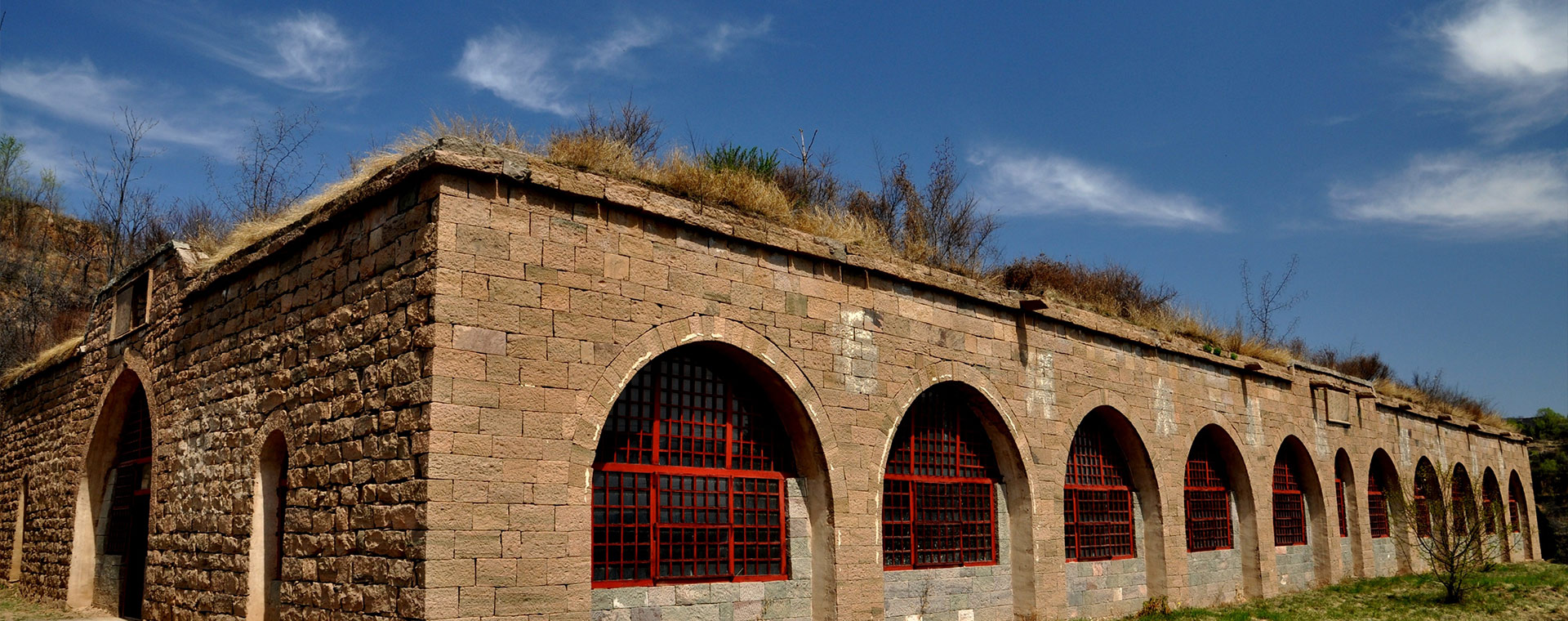Introduction to Kenan Castle
1Kenanpo, formerly known as Nancunpo, is located 39 kilometers northwest of Jixian County and 8 kilometers from Hukou Waterfall. During the Second Sino-Japanese War (1940-1945), it served as the headquarters for the National Second War Area, the Shanxi Provincial Government, the Taiyuan Pacification Office, and the National Revolutionary Comrades' Society. Notable attractions within Kenan Castle include Honglu Tai, Shigan Hall, the Progress Room, and Yang Jinglüe’s poetry.
-
Eight-Offices
The Eight-Offices were the organs of the Command for the National Second War Area, consisting of the Office of Staff, the Office of General Authorities, the Office of the Quartermaster, the Office of Military Affairs, the Office of Food and Supplies, the Office of Clothing, the Office of the Adjutant General, the Office of the Inspector General of Documents, the Office of the Accounting Department, the Provincial Bank, and the Counselor's Office. They were the main institutions of the Command for managing day-to-day affairs.
-
Progress Room
The Progress Room was where the Shanxi provincial government conducted ideological and political education for senior cadres at that time, and it also served as the supervisory authority of the Shanxi provincial government. The east, west, south, and north entrances of the building are inscribed with “Progress Room,” “Criticism Room,” “Review Room,” and “Overall Spirit.”
-
Kenan Holy Spring
There was a spring under the cliff opposite the Kenan Room, with ample water, and more than 20,000 people in Kenan City drank from this spring at that time. There is a small stone cave under the cliff on the left side of the Kenan Room, and the spring in the cave was specifically for Yan Xishan. These two springs are referred to as the Kenan Divine Spring.
-
Kenan Room
The Kenan Room was the office of the National Revolutionary Comrades' Association, which was the highest authority of the Shanxi Provincial Government at that time in Kekan City. Then-President: Yan Xishan, and Then-Vice President: Zhao Daiwen.
-
Universal Cave
Universal Cave served as a cafeteria for authorities in Kenan City and also as a venue for cultural performances and training for military and political personnel, equivalent to a modern “multi-functional hall.” From the outside, it resembles a seven-hole kiln. In fact, there are three kiln caves that serve as underground passages from Yixinggou to Erxingou, extending more than 40 meters deep. The caves are wide and tall, and they connect to each other.
-
River Overlooking Pavilion
River Overlooking Pavilion is located in the east and faces the west, and faces the Yellow River.Behind it was a stone arch bridge that could reach the top of the River Overlooking Pavilion. Yan Xishan often sat at the top of the River Overlooking Pavilion and watched the Yellow River, which means "climbing high and looking faraway". "Pillar of northern sky", four words, is a plaque presented to Yan Xishan by representatives of the architectural craftsman.
-
Truth Room and Competition Room
The Truth Room and Competition Room were named after Yan Xishan's works “Dialectic of Truth” and “Revolutionary Competition.” The Truth Room served not only as Yan Xishan's theoretical research institute but also as a small library. The Competition Room functioned as the office for thirteen senior cadres, which included: chief cadres, two non-part-time cadres, administrative cadres, military cadres, army cadres, economic cadres, military and agricultural cadres, organizational cadres, deliberative cadres, and three development senior cadres, totaling thirteen individuals.
-
Martyr Shrine
The Martyr Shrine was a place where Yan Xishan organized rituals. Inside the shrine, there is a memorial tablet for the martyrs of the war, and there are two couplets carved on the stone pillar in front of the shrine. One couplet is:
“The glory of the shrine shines upon the noble descendants for thousands of years.
The great sound of the Yellow River resonates with the nation's soul time and again”;
The another couplet is:
“The one hundred war drums rose as if to honor our warriors.
Comrades from our homeland pay great tribute to our heroes”.

